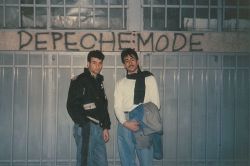The Posters Came From The Walls, Clapham Picture House | reviews, news & interviews
The Posters Came From The Walls, Clapham Picture House
The Posters Came From The Walls, Clapham Picture House
Heartwarming documentary about global legions of misfit Depeche Mode fans
In a pirate television (pirate television!) broadcast from 1992, a large group of Russian youths in flat top haircuts and leather jackets discuss Depeche Mode's appeal. “It's romantic style,” suggests one with absolute assurance, “it's music for the lonely.” It is just one touching, funny moment in a film packed with them, but it also sums up what The Posters Came From The Walls is about. This “music for the lonely” by a band of awkward blokes from Basildon has brought this group of young people together, as it has all the legions of devoted lovers of the band that we see throughout the 58 minutes.
 At a special screening attended by the directors, producer and ex-member of Depeche Mode Alan Wilder, moments like this consistently provoked spontaneous laughter and applause from the audience: far more than one might ever expect from such an arty and serious-looking bunch. But the film deserved it. The laughter was never – or almost never – in mockery at the gallery of misfits and oddballs presented, but rather in joy and astonishment at the sense of belonging and purpose they found in their love for this most peculiar of mega-bands.
At a special screening attended by the directors, producer and ex-member of Depeche Mode Alan Wilder, moments like this consistently provoked spontaneous laughter and applause from the audience: far more than one might ever expect from such an arty and serious-looking bunch. But the film deserved it. The laughter was never – or almost never – in mockery at the gallery of misfits and oddballs presented, but rather in joy and astonishment at the sense of belonging and purpose they found in their love for this most peculiar of mega-bands.
From a crowd of beautiful teenage girls celebrating “Dave Day” (the birthday of singer Dave Gahan) by going apeshit to a Depeche Mode concert movie being projected in a St Petersburg nightclub to a Californian high school marching band playing “Personal Jesus”; from one Iranian man (pictured, with friend, early 1990s) who braved police beatings to dress like his heroes to 16,000 people who turned up for a Los Angeles autograph signing that became a near-riot; from Mexicans imagining Basildon as an olde English Arcadia to goths in Cambridge taking communion in church to Depeche Mode's music – every story was exceptional, but entirely believable in its demonstration of how much pop music can affect people.
German family re-enacting "Enjoy The Silence"
And in keeping with co-director Jeremy Deller's love of grassroots movements and spontaneous cultural upwellings, as seen in his conceptual art projects, it was a testament to how much this affect bypasses the diktats of any kind of authority: not just the authoritarian regimes of East Germany, Romania and Iran defied by the film's subjects in their love for Depeche Mode, but the cultural gatekeepers here in the west who define what is “big” and what is “cool”. After all, we are constantly reminded by almost every media outlet of how “important” U2 – Depeche Mode's contemporaries, and the only band of their era to match their sales and longevity – are; but despite Bono's demagogic pretensions and political glad-handing, it's extremely hard to imagine a similar film showing U2 having had anything like this impact on a personal or political level on so many.
The Q&A which followed served primarily to confirm, as if the film hadn't made it clear, that the directors' and producers' intent was entirely affectionate – that even the whole German family who re-enact Depeche Mode's more surreal videos “as a hobby” were not being pilloried. Alan Wilder's recollections of time with the band showed that the level of religious (literally, in some cases) devotion shown globally to the band was there for almost their entire career, and that they had generally taken it in their stride. One questioner raised the intriguing idea that their appeal in the Eastern Bloc comes from Basildon's concrete arcades and estates so closely resembling grim Communist architecture.
Those involved with the film proved to be as fun, funny and occasionally awkward as their subjects, and continued to socialise in the bar as electro demigod Arthur Baker played records, but the real highpoint of the evening was the film itself: an intriguing look at hidden corners of the modern world, an antidote to our current debased notions of celebrity but also simply one of the most heartwarming and hilariously laugh-out-loud funny documentary films I have ever seen.
- A DVD release of The Pictures Came From The Walls with extra footage is planned for 2010.
- theartsdesk interview with Jeremy Deller on the picture's making

Comments
...